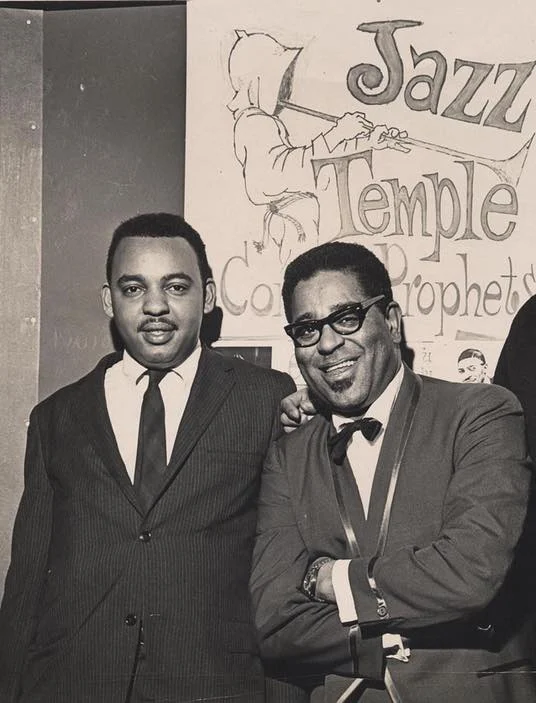|
|
These views are expressed solely by the writer and not necessarily by The Cleveland Observer. This three-part series explores the rise, destruction, and ongoing fight for justice surrounding Winston Willis’s lost empire.
By Ajah Hales
By the early 1970s, businessman Winston Willis had built an empire. His University Circle Properties Development (UCPD) owned over 30 properties at Euclid Avenue and East 105th Street, a thriving Black business district filled with restaurants, gas stations, theaters, and retail shops.
More than 700 Black Clevelanders found employment in his businesses. For the first time, a Black entrepreneur controlled a prime economic hub in Cleveland, proving that Black ownership and self-sufficiency were not just possible but thriving.
But the City of Cleveland had other plans. University Circle Inc. (UCI), a powerful, city-backed nonprofit, wanted the land for educational and medical development, which we now know as the “Eds and Meds” district surrounding Case Western Reserve University, University Hospitals, and the Cleveland Clinic.
The City used eminent domain to push Black residents out of University Circle, making way for institutional expansion. But Willis wasn’t just a resident: he was a businessman and a owner.And that made him a threat.
The City’s Playbook: How They Took Down Winston Willis
Willis had money, businesses, and political connections, so the City couldn’t remove him overnight. Instead, they launched a calculated campaign to dismantle his empire systematically.
A smear tactic was the first. An attack on his reputation was led by The Plain Dealer. Local media ran hit pieces, branding Willis as a slumlord, porn king, and criminal, even though the majority of his businesses were family-friendly establishments.
Journalists staged setups, reporting on power outages at his properties power that the utility companies had intentionally cut off.
They focused exclusively on Willis’s few adult theaters, ignoring his vast portfolio of restaurants, retail spaces, and community businesses.
“The Plain Dealer said he was a Porn King,” his sister Aundra recalls. “But let’s be clear—he didn’t make those movies, he didn’t create them. He distributed them. And a lot of the people going to those theaters were white politicians and officials.”
This steady drumbeat of negative press wasn’t just about tarnishing Willis’ name, it was a calculated effort to turn the public against him, paving the way for what came next.
The Legal Warfare
With headlines labeling him a criminal, the City had the cover to go after him through the courts. Officials piled on building code violations, slapped him with fines, and forced his businesses to close under the pretense of “public safety.”
They refused to renew his business licenses, making it impossible for him to operate. Lawsuits came one after another, many built on false claims, slowly draining his resources and boxing him into a fight he was never meant to win.
Willis refused to back down. He paid his fines, fought the lawsuits, and ran his businesses. However, the more he resisted, the harder the City pushed. case.edu
The Dirty Politics: The Land Grab
City officials needed a way to finish what they started, and they found their answer in urban renewal. Under the banner of “progress,” they used eminent domain, the same tool that had already displaced thousands of Black residents, to come after Willis. They branded his businesses a “nuisance” and manipulated legal loopholes to take his properties without due process, as reporter by Mansfield Frazier columnist for Cool Cleveland
The Final Blow: The Arrest
In the final move to eliminate Winston Willis from Cleveland’s business scene, the City found a way to silence him completely.
They manufactured a criminal case. Willis was arrested on trumped-up charges—accused of assaulting a police officer. He was convicted without evidence, based solely on officers’ testimony. Sentenced to prison, Willis lost any chance to fight back legally. By the time he got out, his empire was gone. This was also reported by Cool Cleveland columnist Mansfeild Frazier
The Aftermath: Erased from History
Once Willis was out of the picture, the City moved quickly to erase his legacy. Officials bulldozed his businesses, absorbed his properties into University Circle Inc., and never acknowledged the theft of his empire.
To this day, no single plaque, street sign, or historical marker exists to recognize what Willis accomplished. In Cleveland at Euclid Avenue and East 105th Street, there was a site once known as the Inner City Disneyland.
A Living Legend Refuses to Be Forgotten
Despite losing everything, Willis never stopped fighting. Willis spent decades in court, suing the City for wrongful seizure of his properties. He repeatedly demanded recognition for what he built in Cleveland. Even in his 80s, he continues telling his story, ensuring that history won’t erase the most outstanding Black businessman Cleveland has ever known.
Why Winston Willis Matters Today
The story of Winston Willis is not just history—it’s a warning. What happened to Willis is part of a larger pattern in America: black success targeted and dismantled by government-backed forces.
The government and capitalist systems have stripped away wealth and a cohesive Black communities through redlining, white flight, the crack cocaine epidemic, and false legal justifications. The results continue today, stolen generational opportunities and leaving communities in economic despair. Once a thriving Black neighborhood, University Circle has become a hub for billion-dollar institutions. The businesses that replaced Willis’ empire cater to a different demographic, while the people who once lived and worked there remain uncompensated. But we remember.The Fight for Justice Continues
Final Thought:
How do we honor Winston Willis? By telling his story, demanding recognition, and ensuring that no future Black entrepreneur has to suffer the same fate. Cleveland may have tried to erase The Greatest Story Never Told—but now, we tell it.
But Not the End of the Fight.
This concludes The Sankofa Series on Winston Willis, his family continues to fight for justice today. Let’s make sure history doesn’t forget him again.







